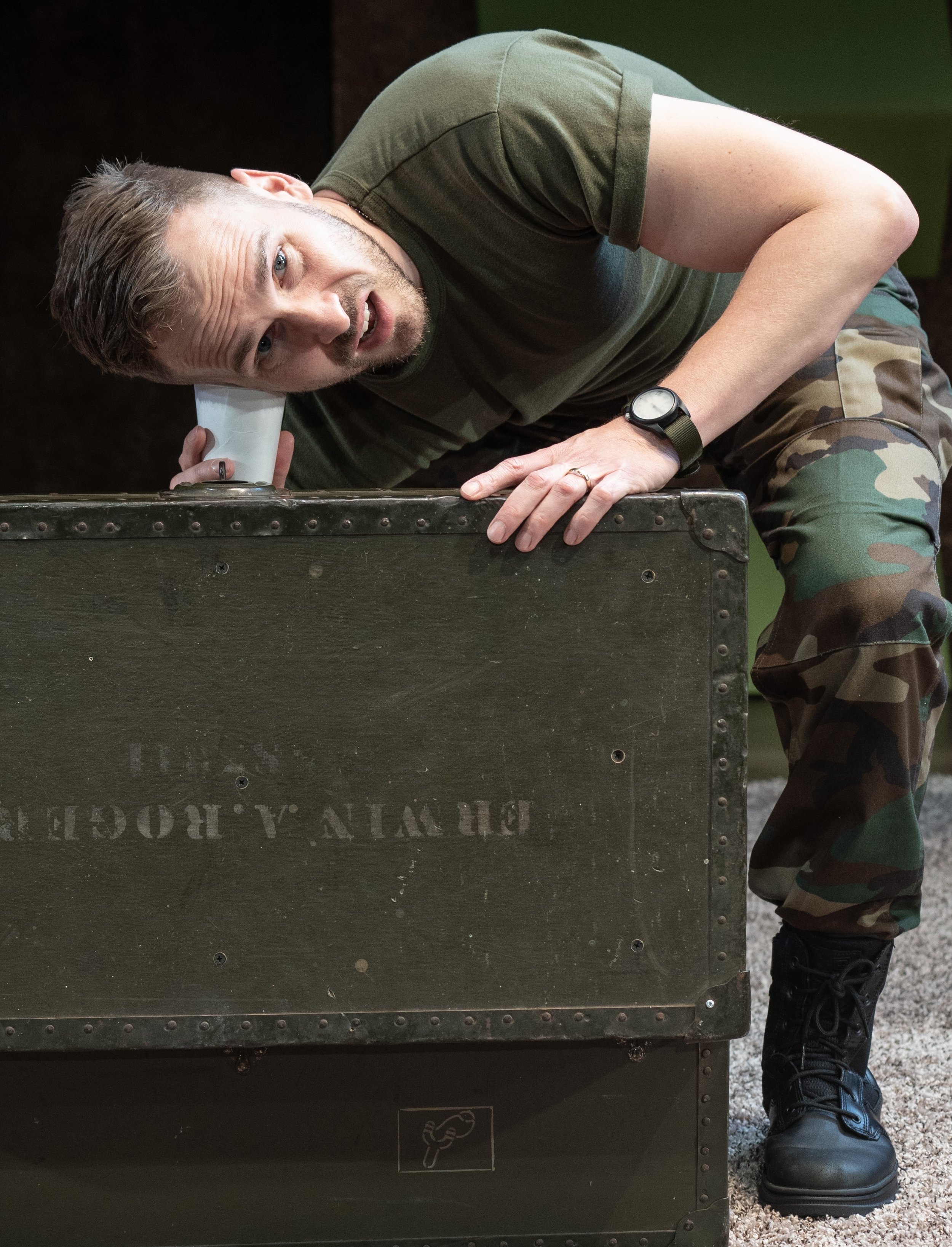As Shane, Esco Jouléy (front) is the darling of the military women in Hansol Jung’s Merry Me. Behind her (from left) are Cindy Cheung, Marinda Anderson, Nicole Villamil, and Shaunette Renée Wilson, who play several different roles.
Hansol Jung’s irreverent new comedy Merry Me is a dramaturgical mash-up that borrows freely from Euripides’s Iphigenia in Aulis, William Wycherley’s The Country Wife, and Tony Kushner’s Angels in America. Along the way it also includes allusions to (naming just a few) poems by Sappho, Fifty Shades of Grey, and The L Word. The conceit is clever and ambitious, but the elements rarely cohere. To the credit of a hardworking and resourceful cast, though, there are some funny moments, but much of the merriment seems forced rather than breezily effortless.
As a trio of angels returning to America, Cheung (left), Wilson and David Ryan Smith, scoff at the foolishness of mere mortals.
Set at an undisclosed naval base, Merry Me recalls the backdrop of Iphigenia in which the gods have punished Agamemnon by suppressing the winds that would enable his fleets to sail. In the contemporary play, a widespread and constraining blackout has compelled General Aga Memnon (David Ryan Smith) to put a temporary halt on all attacks and future battles. Domestically, Memnon’s life is in turmoil because he is not only sexually incapacitated, but his wife Clytemnestra (Cindy Cheung) is more attracted to the magnetic and utterly captivating butch lesbian on base, Lieutenant Shane Horne (Esco Jouléy) than she is to him.
Shane (who is an amalgam of The L Word’s infamous queer character and the womanizing Harry Horner from The Country Wife) has approached psychiatrist Dr. Jess O’Nope (Marinda Anderson) to make her straight, so she presumably will not pose a threat to the married women on the base. (In Wycherley’s Restoration comedy, Horner pretends to be impotent, so he can cunningly cuckold the town’s rich husbands.) Dr. O’Nope agrees to go along with the scheme (in return for sexual favors), and, in no time, Shane seduces Saph Memnon (Nicole Villamil), who is disguised as a man and is the wife of General Memnon’s son, Willy (Ryan Spahn).
Adding to the complications (and more plot to unravel), an Angel (Shaunette Renée Wilson) crashes through Dr. O’Nope’s ceiling and tells her that the “Great Work begins,” commanding her “to kill off cisgendered male species of European descent.” This, according to the Angel, will effectively put an end to the blackout so that the war can proceed as usual. If this Angel’s modus operandi and stuttering cadence sound familiar, it’s because she’s flown in from another play. She tells the would-be prophet:
Ryan Spahn is Private Willy Memnon, a dim but self-described “woke white man.” Photographs by Joan Marcus.
I, I, I am the angel from Angels in America,
As brought to you by
The Ellen McLaughlin on that fateful day of May 1991
The Emma Thompson that justified your stolen HBO Go ID and password
I have come to you with messages and implements of the heavenly kind!
The clash of cultural references drawn from highbrow, lowbrow, and every-brow-in-between sources is reminiscent of the plays that Charles Ludlam wrote for his Ridiculous Theatrical Company. Those plays, such as The Mystery of Irma Vep, The Artificial Jungle, and Der Ring Gott Farblonjet, are gleeful sendups of penny dreadfuls, film noir, and opera that also skewered conventional notions of gender and sexuality. Merry Me undertakes a similar project, but the ribaldry seems less organic. While parodies and satires always include a fair number of self-referential intimations and winks toward an in-on-the-joke audience, Merry Me nudges a bit too hard.
Additionally, as directed by Leigh Silverman, some of the gags, such as a communication system consisting of paper cups and a string, are belabored to the point of annoyance. Quips about “broken peckers” and “broken pussies” cease to be funny after the second or third mention.
The Angel (Wilson) commands a new prophet to save the world.
If the material is not always as hilarious as one would want it to be, the performers are generally strong. As the Angel, who also serves as a narrator, Wilson is wry and comically smug, and Jouléy is all swagger and allure. Anderson has some amusing bits as an axe-wielding prophet, and Smith, Cheung, Villamil, and Spahn as the Memnon brood, individually and collectively convey the sexual and familial dysfunctions.
With sets like pop-up books, by Rachel Hauck, witty and dazzling (particularly for the Angel) costumes by Alejo Vietti, and appropriately self-consciously theatrical lighting, Merry Me is visually a fabulous and queer confection. Caroline Eng and Kate Marvin’s sound design provide some striking effects, but there is some effort required, especially for audiences seated in the rear of the house, to hear all the dialogue. Unfortunately, this aspect of the production encapsulates the central problem: The merriment is more often strained rather than insouciant and nimble.
Merry Me runs through Nov. 19 at New York Theatre Workshop (79 E .4th St.). Evening performances are at 7 p.m. Tuesday through Thursday and at 8 p.m. Friday and Saturday; matinees are at 2 p.m. Saturday and Sunday; and 7 p.m. on Sunday. For tickets, call (212) 460-5475 or visit nytw.org.
Playwright: Hansol Jung
Director: Leigh Silverman
Sets: Rachel Hauck
Costumes: Alejo Vietti
Lighting: Barbara Samuels
Sound: Caroline Eng and Kate Marvin






